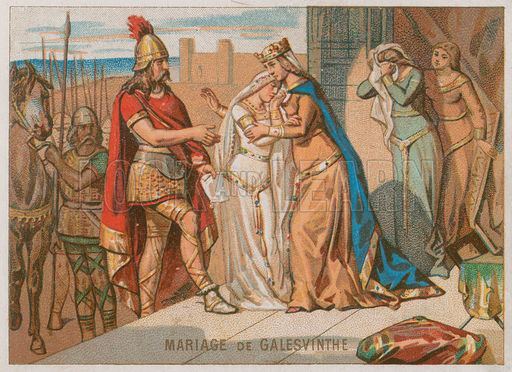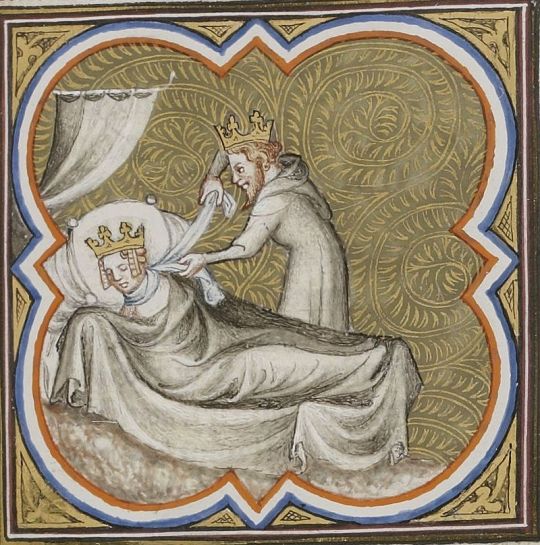Text


Brunhild could not help but be unmoored; her rival had been the one constant in the ever-shifting political waters. Fredegund’s actions had informed her own for the past thirty years. She had grown so used to trying to anticipate Fredegund’s next plot; it would have felt strange to drift to sleep without that worry. Brunhild also felt her age. Nearly every royal, bishop and duke she had worked with or against was gone, replaced by their own children, or by a new family altogether. Brunhild’s political activities in the aftermath of Fredegund’s death were strangely civil. She launched no attacks on Neustria, not even to take back the recently conquered territories. It is unclear whether that was due to bad advice by her military advisers or if Brunhild herself decided to allow Neustria to mourn its queen in peace. But Brunhild could afford to be magnanimous.
Shelley Puhak, The Dark Queens: A gripping tale of power, ambition and murderous rivalry in early medieval
#brunhilde#brunhild#brunhilda#brunegilda#brunequilda#fredegund#french history#women in history#merovingians
49 notes
·
View notes
Text

Day 14: Fredegund, wife of Chilperic I and mother of Chlothar II (welcome to the middle ages!). She has a negative reputation for seducing her way into power and allegedly attempting to kill her own daughter, but she was a generous patron of religious orders and a shrewd politician. For once, we have a powerful regent who died of natural causes.
#grayjoytober2024#fredegund#historical women#merovingian#medieval france#history art#traditional art#merovingian tag#france tag#inktober#inktober 2024#drawtober 2024#drawtober#6th century
7 notes
·
View notes
Text
Perhaps the best-known example of Fredegund’s resurrection in myth and literature is Shakespeare’s use of her ‘walking forest’ battle strategy in Macbeth.
- Shelley Puhak, The Dark Queens: A gripping tale of power, ambition and murderous rivalry in early France
#quote#shelley puhak#the dark queens#narrative nonfiction#french history#women in history#shakespeare#Fredegund
7 notes
·
View notes
Text
"The existence of alternative narratives for Chilperic's reign has encouraged some scholars to seek to restore the king's reputation, emphasizing in particular his audacious literary and theological efforts, which Gregory had mocked mercilessly. Fredegund, in contrast, has been comparatively less fortunate in her treatment by modern historians. Much like Christine de Pizan (ca. 1365-1430), who described Fredegund in her Book of the City of Ladies as "unnaturally cruel for a woman" while also acknowledging that the queen ruled "most wisely after her husband's death," scholars willing to concede the queen's intelligence and political acumen have been unable to abandon entirely those negative characteristics originally assigned to Fredegund by Gregory of Tours. Thus, for Wemple, Women in Frankish Society, 63-64, Fredegund is a woman of "courage and acumen," but also, "ruthless and manipulative." For Goffart, The Narrators of Barbarian History, 224, she is "savage but resolute." For Ian Wood, The Merovingian Kingdoms (London: Longman, 1994), 124, she is "a model, if somewhat bloodthirsty, queen.”
-Gregory I. Halfond, "Sis Quoque Catholicis Religionis Apex: The Ecclesiastical Patronage of Chilperic I and Fredegund"
14 notes
·
View notes
Text
How in the world is Brunhilde and Fregegund rivalry not made into a comedy show of The Real Housewives of Francia
3 notes
·
View notes
Text
Time will Tell Comic: 5 year hiatus ended
Time will Tell [COMPLETE] | クラソウ
https://www.pixiv.net/en/artworks/80737634
I upload the comic as is at the penciling stage. I lost my attention-span to clean up. Sorry.
But yes, I ended the comic! For those 2 Fredegund fans, thank you for waiting.

Aaaaand I'm moving on! Goodbye.
#fredegund#suikoden#suikoden tierkreis#suikoden fredegund#robots robots robots!#robot heaven is calling for me#clawsou art
8 notes
·
View notes
Text

3 notes
·
View notes
Text

Lawrence Alma Tadema - Fredegund by the Deathbed of Bishop Praetextatus, 1864.
Versions >> 1 | 2
#Lawrence Alma Tadema#Fredegund by the Deathbed of Bishop Praetextatus#Fredegund#death bed#death#Bishop Praetextatus
8 notes
·
View notes
Text
Yeah so whatever fredegund and brunhild had going on… I need that in hotd and/or aspiaf asap!!!! I know GRRM is an english history fanboy but my merovingian blorbos-
1 note
·
View note
Text

The Death of Galswintha
Brunhild’s elder sister, Galswintha, arrived in Frankish lands as Chilperic I of Neustria’s betrothed in July of 568, trailed by even more treasure and finery than her sister had been. At Rouen, Chilperic tripped over himself to provide an even more spectacular reception than his brother had given Brunhild. He marched his army more than one hundred miles west, so they might meet his new bride ‘near the curved bed’ of the river Seine as she disembarked from her ship. Rather than being greeted by a palace hall full of nobles, Galswintha was welcomed by Chilperic’s entire army on bended knee, swearing an oath of allegiance to their new queen. Chilperic never did anything in half measure. And Galswintha was married not in the great hall of a converted basilica, but in the cathedral at Rouen.
Less than six months later, though, a third wedding would take place. No cathedral this time, just a handful of nobles quickly assembled in the great room of a royal villa. A week before this third wedding, King Chilperic and Queen Galswintha had been fighting. As she stormed and raged, messengers were seen riding out from the palace at all hours, delivering missives and pleas to her sister and her mother. Galswintha had caught Chilperic in bed, again, with the slave girl Fredegund. The queen was furious that ‘he showed no respect to her at all’; she was distraught over ‘the insults which she had to endure’. She wanted to return home. Was it truly so unendurable? Yes, to be made a fool of like that. And Chilperic had such a temper! She would return home, even if it meant leaving her enormous dowry behind. One morning, soon thereafter, the palace woke to a horrible scene. Galswintha had been found dead in her bed, strangled in her sleep.

Chilperic did not once address his subjects on the matter of Galswintha’s untimely demise. There were no searches for her assailants or rewards offered for their capture. No one was ever questioned or punished, not even the guards who had been posted at the door of the royal bedchamber that night. It was Fortunatus’s friend Gregory who stated plainly what the whole of France was thinking: ‘Chilperic ordered Galswintha to be strangled… and found her dead on the bed.’
Just months after Galswintha’s wedding, Brunhild had received word that her father had dropped dead, presumably of a heart attack. When the next message arrived, this one from Galswintha’s terrified nursemaid, it was reported that Brunhild went into shock. In less than eighteen months, Brunhild had lost her homeland, her father and now her only sibling. At the news of Galswintha’s death, Spain falls into even greater lamentations, and her grieving mother ‘collapses in distress, her knees giving way’ and faints. The enraged mother of the murdered princess was still a major player in international politics; after the death of King Athanagild, she had married his successor.

The few tears Chilperic reportedly shed shortly after Galswintha’s murder may have even been genuine: he was sad that things had come to this. It was nothing personal; Galswintha was simply no longer useful to him. But Fredegund was. Chilperic was obviously incredibly attracted to her. And his attraction also solved several problems. A low-born woman came without the complications of a powerful family; she would be happy with whatever meagre morgengabe he gave her. Three days later, arrayed in the brightly dyed linens and jewels of her predecessor, Fredegund stood at the altar, smiling up at Chilperic.

Galswintha’s murder has been portrayed in art numerous times throughout the centuries since, and the blame always rests on Chilperic, so much so that illuminated manuscripts and paintings portray the king of Neustria himself, wearing his crown and grinning rakishly, wrapping a cloth around the neck of his sleeping wife. In some versions, Fredegund looks on. Whether Fredegund really urged him on or not, she knew people would always assume that she had, cleverly disposing of yet another rival for the king’s affections.
Source:
Shelley Puhak, The Dark Queens: A gripping tale of power, ambition and murderous rivalry in early medieval
#galswintha#chilperic#fredegund#brunhild#brunequilda#brunhilda#brunegilda#french history#merovingians#neustria
14 notes
·
View notes
Note
What is it about fredegund that makes her your favourite? No shade just curious
Hi, anon! I hope it's no shade, haha!
Well, I guess it's just a first interest that later grew into fascination. I have a soft spot for morally-grey historical female characters, because the more they are despised by contemporaries or by historiography, the more it gives me the sign that this woman in particular was interesting and that this wholed resentement can hide a strong mind or a peculiar path.
I never bought the tale of the "bloody crual witch-persona" that historians have crafted around Fredegund, and it really encouraged me to look about her in deeper details to just see what was really true and what was just blatant misogyny, and god, oh bad she was treated in a narrative view!
So, as I went on, it appeared to me that Fredegund was way more nuanced and way more human that people have said about her before. It's not what actually make her my favorite, but in some way it motivates me to speak for her, to share her story in a less black and white version. To do her justice, after all this bloody and slutty version of her story! So, if Fredegund should have at least one supportive person in this era, it will always be me :)
7 notes
·
View notes
Text
Even though the Dark Queens were absent from my books, they were in plain sight throughout my childhood as the women I was warned against becoming. The wicked stepmother in my fairy tales, the haughty Jezebel who was preached against in church, the fat lady singing at the opera: all were objects of hatred or ridicule. Between the silence of suppressed history and oppressive blare of stereotypes, what space remains?
- Shelley Puhak, The Dark Queens: A gripping tale of power, ambition and murderous rivalry in early France
#quote#shelley puhak#the dark queens#fredegund#brunhild#narrative nonfiction#french history#women in history#women in power
2 notes
·
View notes
Text
In the Histories, Brunhild and Fredegund appear as political adversaries and moral opposites. Gregory encouraged his audience to compare the two queens by emphasising their differences. He said nothing bad of Brunhild, yet he accused Fredegund of a great many crimes, including murder, sacrilege, witchcraft, and treason.
…Looking beyond Gregory’s interpretation, Brunhild and Fredegund may not have been so different. Both queens reigned at the side of their husbands and then remained politically influential during their widowhood as mothers of their minor sons. Both formed close, politically useful relationships with some bishops and quarrelled with others. Both cared about the education of their children and made efforts to rescue daughters who fell into the hands of rival powers. They treated their inferiors in a manner befitting a ruler, defending honour and threatening violence much as did kings and other powerful men. Their skilful evocation of both fear and love would have made Machiavelli blush. They donated to the church, venerated the saints, and kept an eye on those who might use illegitimate sources of spiritual power, such as witchcraft or poison, with due attention. Other sources recognised this fundamental similarity: Venantius Fortunatus, ever the dutiful royal client, praised Fredegund and Brunhild alike, while the Chronicles of Fredegar, written from the safety of a later generation, criticised them equally. Yet Gregory insisted they were rivals and moral opposites. His task was not an easy one. Rumours of Fredegund’s misdeeds may have abounded, but stories of Brunhild’s virtues were rather more obscure. Thus, Gregory carefully arranged his material, encouraging his audience to compare the two and to find Brunhild to be the better. Why so complex a narrative strategy? Gregory laboured under burdensome constraints, coming into personal conflict with Fredegund, while finding Brunhild to be a powerful, if intimidating, patron.
-E.T. Dailey, “Queens, Consorts, Concubines: Gregory of Tours and the Women of the Merovingian Elite”
#historicwomendaily#merovingian period#fredegund#brunehilde#brunhild#gregory of tours#women in history#french history#fredegund regina#6th century#merovingian history#queue#my post
14 notes
·
View notes
Text
FREDEGUND // QUEEN OF SOISSONS
“She was Queen consort of Chilperic I, the Merovingian Frankish king of Soissons. Fredegund served as regent from 584 to 597 before her son came of age. She is a good example of someone whose reputation is based more on what men said about her than on facts. Gregory of Tours depicted her as ruthlessly murderous and sadistically cruel. He even reported that she tried to murder her own daughter using a treasure chest. Whatever the truth, it is a fabulous soap opera of assassinations, adultery and jealousy. The death of Fredegund's nemesis Brunhilda is particularly gruesome.”


0 notes
Text


Proud of these 2 pieces I did for the Suikoden Popularity Elections 2023!
#fredegund#suikoden fredegund#suikoden#suikoden tierkreis#gadget z#suikoden gadget z#suikoden gadget#suikoden iii#suikoden 3#clawsou art
9 notes
·
View notes
